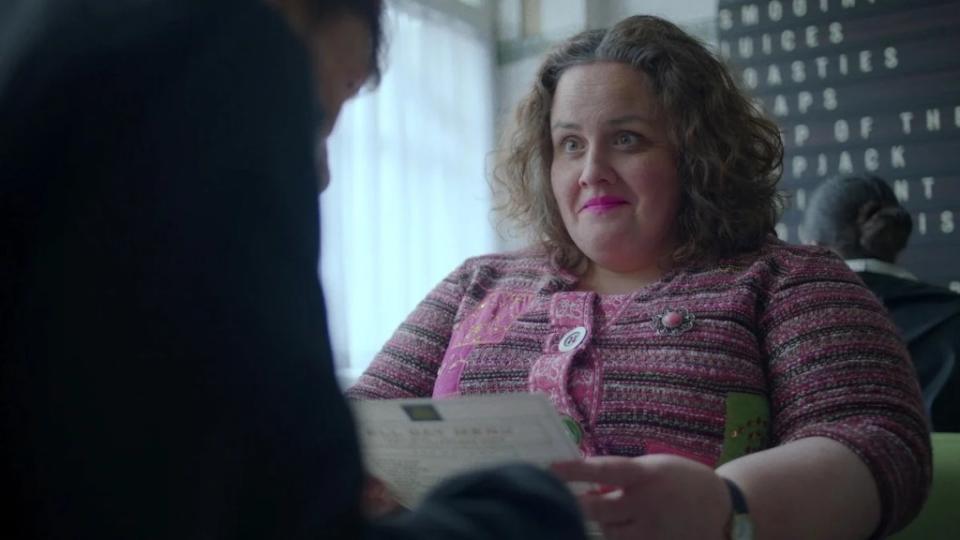Why We’re So Addicted to Shows Like ‘Baby Reindeer’: Trauma, Taboo and the Lure of the ‘True Story’
- Oops!Something went wrong.Please try again later.
- Oops!Something went wrong.Please try again later.
- Oops!Something went wrong.Please try again later.
“Baby Reindeer,” Richard Gadd’s disturbing yet addictive Netflix series of how he was stalked by an obsessive fan, continues to captivate viewers and dominate TV ratings more than a month after it first premiered.
The series, which dropped all 7 episodes on April 11, has shown astonishing staying power as word of mouth spread. It has also shown that fans can be as doggedly obsessive in their own way: The zealous effort to identify the real people behind the series, which led to one of Gadd’s friends receiving death threats for being the series’ alleged rapist, forced the showrunner to publicly ask fans to stop looking for the show’s real-life counterparts.
TheWrap spoke to a number of experts who zeroed in on some of the reasons the one-of-a-kind show has become such a must-see. In addition to stalking, “Baby Reindeer” touches on topics not often covered on TV, such as male rape. And how many series feature the main character dating a trans woman?
Viewers can argue about the degree of truth in the messy events that befall Gadd’s character Donny Dunn, but they also can’t look away.
The fact that the series is based on Gadd’s own experiences lends it a rare authenticity, but that has also proved problematic for truth-seeking fans. It was all too easy to spot the real Martha — so brilliantly and chaotically played by Jessica Gunning. Fiona Harvey, a Scottish lawyer who claims the mentally unhinged character is based on her, has 10-year old tweets about “hanging drapes” to back up that claim, and has since come forward to call the series “very, very defamatory.”
Netflix’s UK policy chief Benjamin King said in a UK Parliament hearing that the series is based on a “true story” and that the streamer and Clerkenwell Films took “every reasonable precaution in disguising the real-life identities of the people involved in that story.”
The lure of the true story
Since the pandemic, audiences can’t seem to get enough of bizarre true crime stories, whether they are delivered in a docuseries format, like Netflix’s “Making a Murderer” or “Abducted in Plain Sight”; dramatized, such as Hulu’s “The Act” and HBO’s “The Staircase”; or discussed at length in podcasts like “The Thing About Pam” and “The Dropout.”
“Audiences seem to respond to ‘based or inspired on a true story’ because they think that a story that is based on real life is more authentic and interesting than if it is made up,” Joe Saltzman, a professor of Journalism and Communication at USC, told TheWrap.
“There is a sense of eavesdropping on real life, of finding out what really happened, what is the ‘true’ story, rather than a piece of fiction,” added Saltzman. “It makes an audience feel they are learning something no one else knew before the film was made. It makes them feel special.”

“At least I’m not like the guy in ‘Baby Reindeer’”
Danielle Lindemann, a sociologist and author of “True Story: What Reality TV Says about Us,” explained that viewers are drawn to reality TV and to true crime shows because of “our tantalizing blend of proximity to, and distance from, the people involved.” As Lindemann sees it, “They’re just regular people ‘like us’ who have been put into extraordinary circumstances… but at the same time, there’s a certain voyeuristic relief in looking at those real people and being able to say, ‘That’s NOT me.’
“Even though my life may have pain, and be screwed up in its own ways, at least I’m not like the guy in ‘Baby Reindeer,’’’ she says of the beleaguered character played by Gadd, whose poor choices in dealing with his stalker complicate an already dire situation.
“People feel entitled to the personal lives of others because they’ve seen something on TV,” said Ashley Kolaya, whose work USC Annenberg’s Mental Health Storytelling Initiative helps creators craft more authentic and responsible portrayals of mental health in Hollywood. “That’s kind of embedded in our culture in very strange ways.”
The show has inspired male victims of sexual assault to come forward
People are also obsessing about the series because shows rarely feature men as victims. Gadd’s sympathetic portrayal of his own real-life sexual assault at the hands of a man he trusted is almost unprecedented, as is the inclusion of a trans female character as his love interest.
At a For Your Consideration event for the series at the Directors Guild of America (DGA), Gunning said that since the show premiered, the number of men reporting a sexual assaults in the U.K. had gone up 200% with the charity We Are Survivors, with 60% of victims citing “Baby Reindeer” as the reason they reported their assault.
“There’s something that’s so tempting about the idea of self disclosure,” said Kolaya. Hearing someone else’s experience with trauma “has an impact both on the person who is telling the story and the audience that’s hearing it.”
She added that “this kind of deeply personal story invites everyone to engage with a taboo.”
This kind of deeply personal story invites everyone to engage with a taboo .
Ashley Kolaya, USC Annenberg’s Mental Health Storytelling Initiative
Gini Sikes, a Los Angeles-based stand-up comedian who’s also an expert on true crime — she recently appeared on “Mean Girl Murders” to talk about the 1990 Dairy Princess murder in Wisconsin — stumbled across the show a week or two after it premiered and watched it all in one sitting. “It was so wild and so raw,” she told TheWrap. “What struck me is it didn’t fit anything I’d seen before. If you tried to pitch this as a fictional story, no one would believe it,” she said.
Like so many other viewers, she was especially taken with how vulnerable — and even unlikable — Gadd’s character can be at times: “He was showing a side of himself that was not pleasant,” Sikes said.
“It’s a series about very uncomfortable things and I think what makes people a little uncomfortable can be really popular,” said Kolaya. It can also inspire people who’ve been through something similar to want to share their own stories.
Groundbreaking trans representation

Nava Mau, a trans actress who plays Donny’s trans love interest Teri, was “transfixed by [the script], because I had never read anything like it before,” she told GQ. “There’s this character that almost felt like, in a parallel universe, someone was writing about me. It makes you almost jittery to see a character that speaks to you in that way.”
Mau added that, historically, many depictions of trans women have been “violent and demeaning and dehumanizing,” whereas Teri is confident, self-assured and non-tragic. “Richard had a relationship with a trans woman that inspired the story, so I think that allowed for a level of nuance and intricacy that still feels groundbreaking,” said the actress.
The fact the series has blown up as it has caught Gadd by surprise. At the FYC event, he said he never expected the show to be as popular as it has become.
It was so wild and so raw… If you tried to pitch this as a fictional story, no one would believe it.
Gini Sikes, Los Angeles-based stand-up comic
And he likely never expected that Harvey, who claims to be the inspiration for Martha, would threaten to sue him and Netflix. (After giving an online interview to Piers Morgan, in which she denied stalking Gadd and said she had never been to jail, Harvey is asking the British broadcaster for $1.25 million. )
James Nadler, a screenwriter and ethics professor at Toronto Metropolitan University’s School of Media, said that Gadd “was being naive if he thinks that if you put something on Netflix, nobody will watch.”
While the legal ramifications of Gadd’s series are still pending, it’s clear that audiences crave more shows with messy truths about complicated and even unlikable people.
In the meantime, the show is a strong bet to nab several Emmy nominations, including for Gadd, Gunning and Mau. Other “based on a true story” roles have led to award wins for Patricia Arquette (“The Act”), Amanda Seyfried (“The Dropout”) and “Glee” alum Darren Criss, who portrayed murderer Andrew Cunanan in “The Assassination of Gianni Versace: American Crime Story.”
The post Why We’re So Addicted to Shows Like ‘Baby Reindeer’: Trauma, Taboo and the Lure of the ‘True Story’ appeared first on TheWrap.

